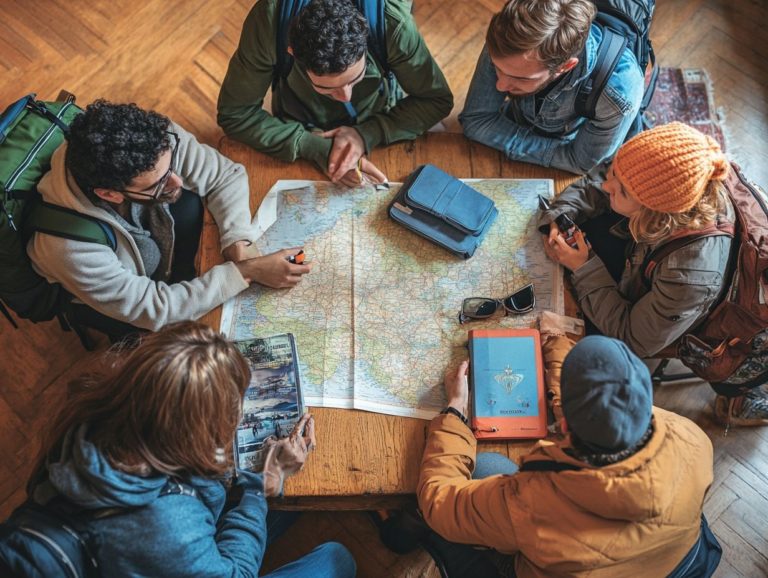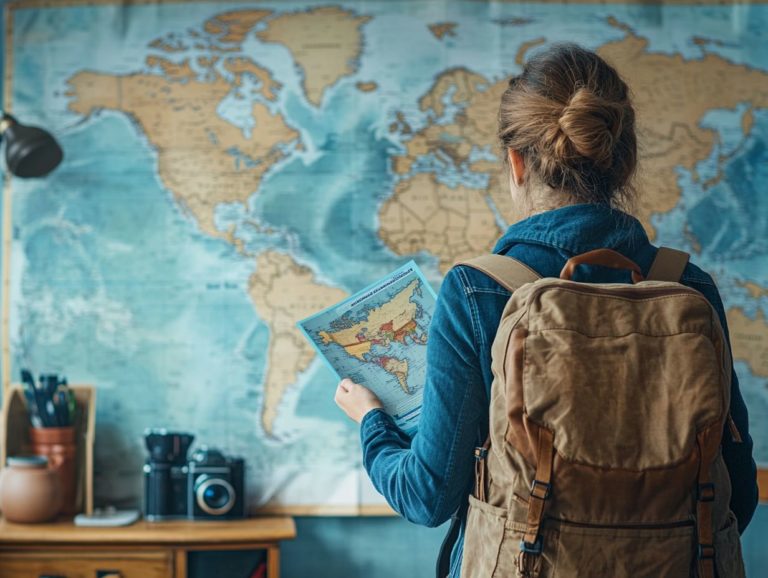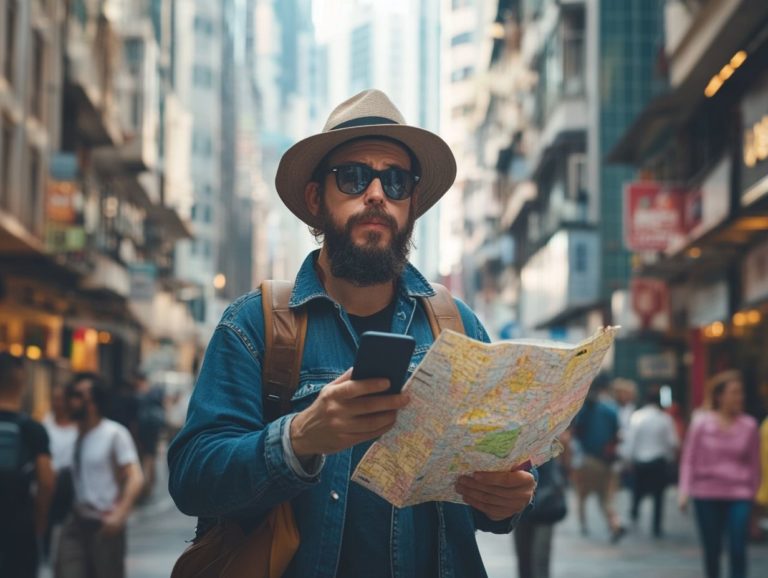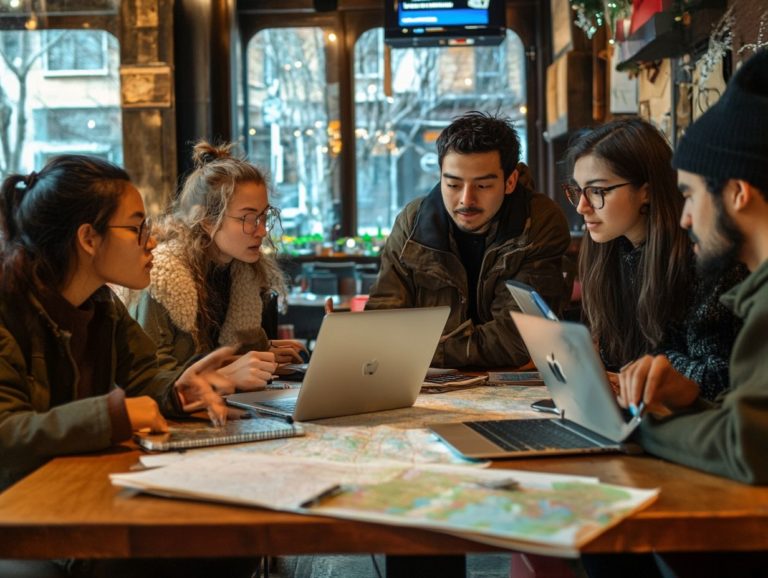How to Pack Light for Your Study Abroad Experience
Packing light for your study abroad adventure can truly enhance your experience, turning it into something more enjoyable and stress-free.
By minimizing your luggage, you ll not only save on baggage fees charges airlines apply when your luggage exceeds certain weight limits but also reduce the physical burden of travel. This guide will provide you with essential items to include, effective packing tips, and strategies for maximizing space in your luggage.
Moreover, we ll explore what you can leave behind, ensuring you travel with both intelligence and ease.
Get ready to pack like a pro!
Contents
- Key Takeaways:
- Benefits of Packing Light for Study Abroad
- Essential Items to Pack
- Tips for Efficient Packing
- Maximizing Space in Your Luggage
- What Not to Pack
- Frequently Asked Questions
- How can I pack light for my study abroad experience?
- How many outfits should I pack for my study abroad trip?
- What are some essential items to pack for a study abroad trip?
- How can I save space when packing for my study abroad trip?
- Should I pack any snacks for my study abroad trip?
- How can I avoid overpacking for my study abroad trip?
Key Takeaways:
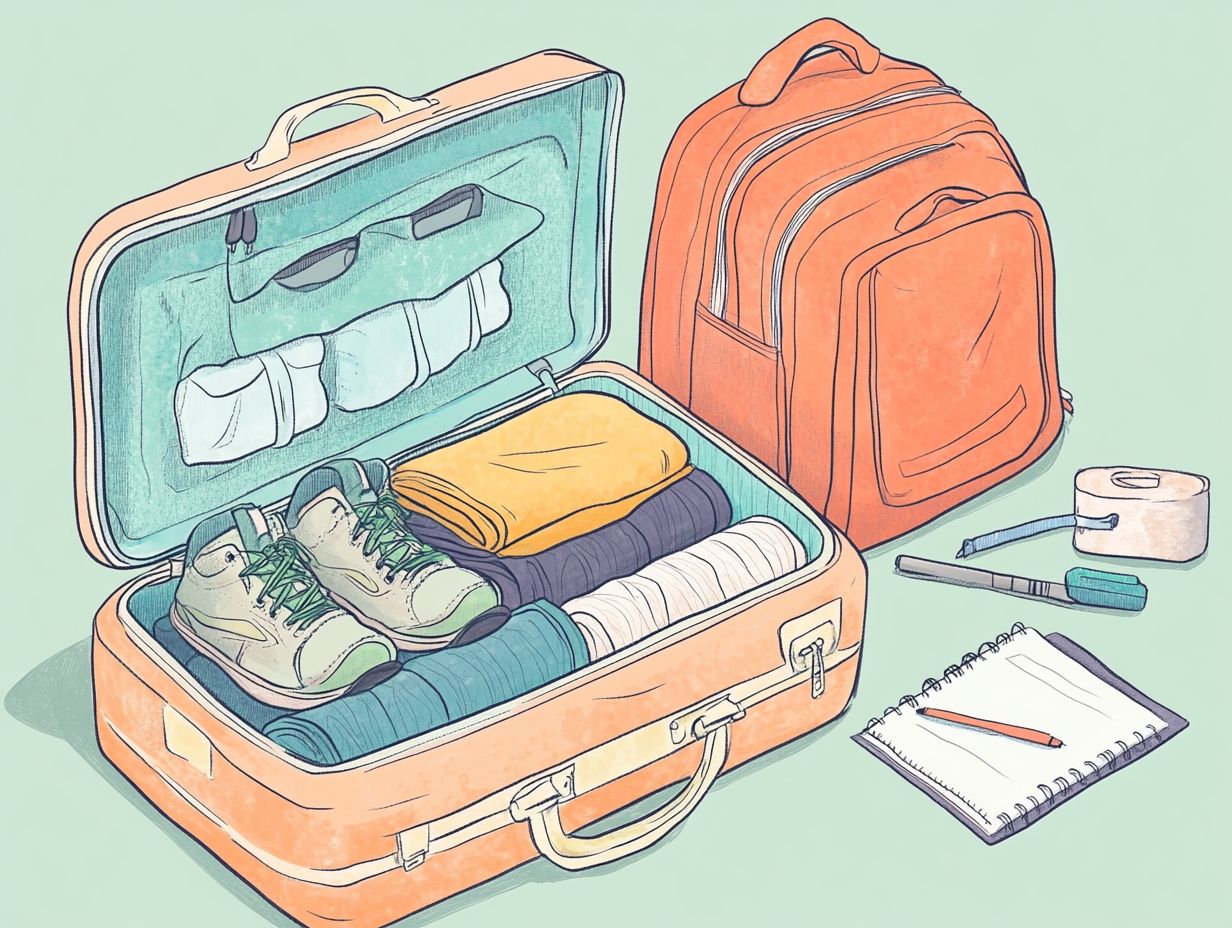
- Packing light for your study abroad experience can save you money on baggage fees and lessen the strain on your body.
- Consider packing multi-purpose clothing and using space-saving techniques like rolling clothes to maximize space in your luggage.
- Leave behind items that can be easily purchased abroad and avoid packing restricted items to make your travel experience smoother.
Benefits of Packing Light for Study Abroad
Packing light for your study abroad journey can truly elevate your experience. By reducing baggage fees, alleviating physical strain, and granting you increased flexibility during your travels, you open the door to a more enjoyable adventure.
When you minimize your luggage, you simplify your airport experience and embrace a more comfortable journey. This makes it easier to adapt to diverse cultural norms and local customs.
Selecting lightweight clothing and comfortable shoes is essential. It equips you to explore your new surroundings freely, unencumbered by the weight of excessive baggage.
Save Money on Baggage Fees
Packing light for your study abroad trip offers immediate benefits, especially when it comes to saving on baggage fees. Those costs can add up quickly if you exceed the airline’s weight limits.
By minimizing your luggage to just the essentials, you can sidestep those hefty charges for heavier bags. It’s crucial to understand the varying airline regulations, as they can differ significantly and lead to unexpected expenses. When preparing for your international adventure, familiarize yourself with the travel document requirements to avoid any last-minute hiccups.
Manage your local currency wisely to ensure you have enough funds for daily expenses without overspending. This enhances your overall travel experience while prioritizing financial freedom abroad.
Less Strain on Your Body
Carrying less luggage during your study abroad adventure means less strain on your body. This leads to a more enjoyable travel experience as you move around bustling airports and vibrant city streets.
When you opt for a lightweight backpack and carefully selected essentials, you’ll find it much easier to get between destinations without the overwhelming burden of heavy bags. This smart choice reduces physical fatigue and elevates your overall travel experience, allowing you to fully immerse yourself in new cultures and environments.
Wearing comfortable shoes is essential, as they help prevent blisters and soreness during those long walks. By prioritizing a lighter load and supportive footwear, you can maintain a smooth itinerary and embrace spontaneous exploration without the worries of exhaustion or injury.
Essential Items to Pack
As you prepare for your study abroad adventure, identifying the essential items to pack becomes paramount. Your list should include important documents, a well-stocked first aid kit, and necessary toiletries to ensure you re fully equipped for your time away.
Among those critical documents are your passport and visa, accompanied by photocopies of essential items and medication prescriptions to sidestep any inconveniences during your journey. By organizing these packing essentials with precision, you ll be free to immerse yourself in the local culture and customs of your new environment without a hitch.
Important Documents

Among the most critical elements to prepare for your study abroad experience are your important documents, particularly your passport, visa, and travel insurance details.
These essential papers not only serve as your identification but also play a crucial role in ensuring your trip abroad goes smoothly. Maintaining an organized approach to storing these documents can significantly reduce stress during international travel.
It s wise to create both digital and physical copies of these vital records to ensure they re always at your fingertips. Consider investing in a travel wallet or a dedicated folder to keep everything neatly in one place.
Consider sharing copies with a trusted friend or family member. This adds an extra layer of security and makes retrieval easier if you lose your documents.
Multi-purpose Clothing
Choosing clothes that serve multiple purposes is smart for your study abroad packing. They help you adapt effortlessly to varying weather conditions while keeping your luggage light.
Imagine having versatile pieces like a classic dress that transforms from day to evening with just a few accessory swaps, or lightweight trousers that pair perfectly with a casual tee and a blazer. This way, you can navigate casual outings and more formal events with ease.
Incorporating layers, such as a chic cardigan or a travel-friendly jacket, is essential for adjusting to local climates while ensuring you remain comfortable and stylish. This approach saves space and allows you to express your style. Practicality and fashion can go hand in hand.
Tips for Efficient Packing
Efficient packing is essential for a smooth study abroad experience! It helps you make the most of your luggage space while ensuring you have all the necessary items without the headache of overpacking.
By employing techniques like rolling your clothes instead of folding them, you can save significant space in your luggage. Use compression bags and other space-saving methods to enhance fit and minimize bulk.
Mastering these packing strategies ensures you ll have all your essentials at hand while maintaining a manageable load as you travel.
Rolling vs Folding Clothes
When packing clothing for your study abroad adventure, understanding the difference between rolling and folding can significantly enhance your luggage efficiency.
Each method has its perks and drawbacks. They affect how much you can fit in your suitcase and the condition of your clothes upon arrival. Rolling clothes tends to create a more compact arrangement, allowing you to maximize every precious inch of space. Rolling can also help reduce wrinkles, especially in lightweight clothes like t-shirts and dresses.
On the flip side, folding may seem like the classic approach. It offers a flat surface that can be advantageous for certain types of clothing or structured items. However, it often consumes more space and can lead to unwanted creases, particularly if packed tightly together.
Taking these factors into account gives you the power to make more informed decisions about your packing techniques, ensuring you’re well-prepared for your journey.
Utilizing Space-saving Techniques
Utilizing space-saving techniques can truly transform your packing experience for study abroad, allowing you to fit more essentials into your luggage without sacrificing organization.
By thoughtfully incorporating tools like packing cubes and compression bags, you can streamline your belongings and easily find what you need. Packing cubes not only help you categorize items but also serve as a visual inventory, enabling you to quickly locate essentials, from seasonal clothing to school supplies.
Compression bags elevate the game further by shrinking bulky items, maximizing your luggage space especially crucial when you’re navigating those strict baggage limits. These methods keep your items secure and make your travel experience smoother. Focus on your adventure, not the chaos of luggage!
Maximizing Space in Your Luggage
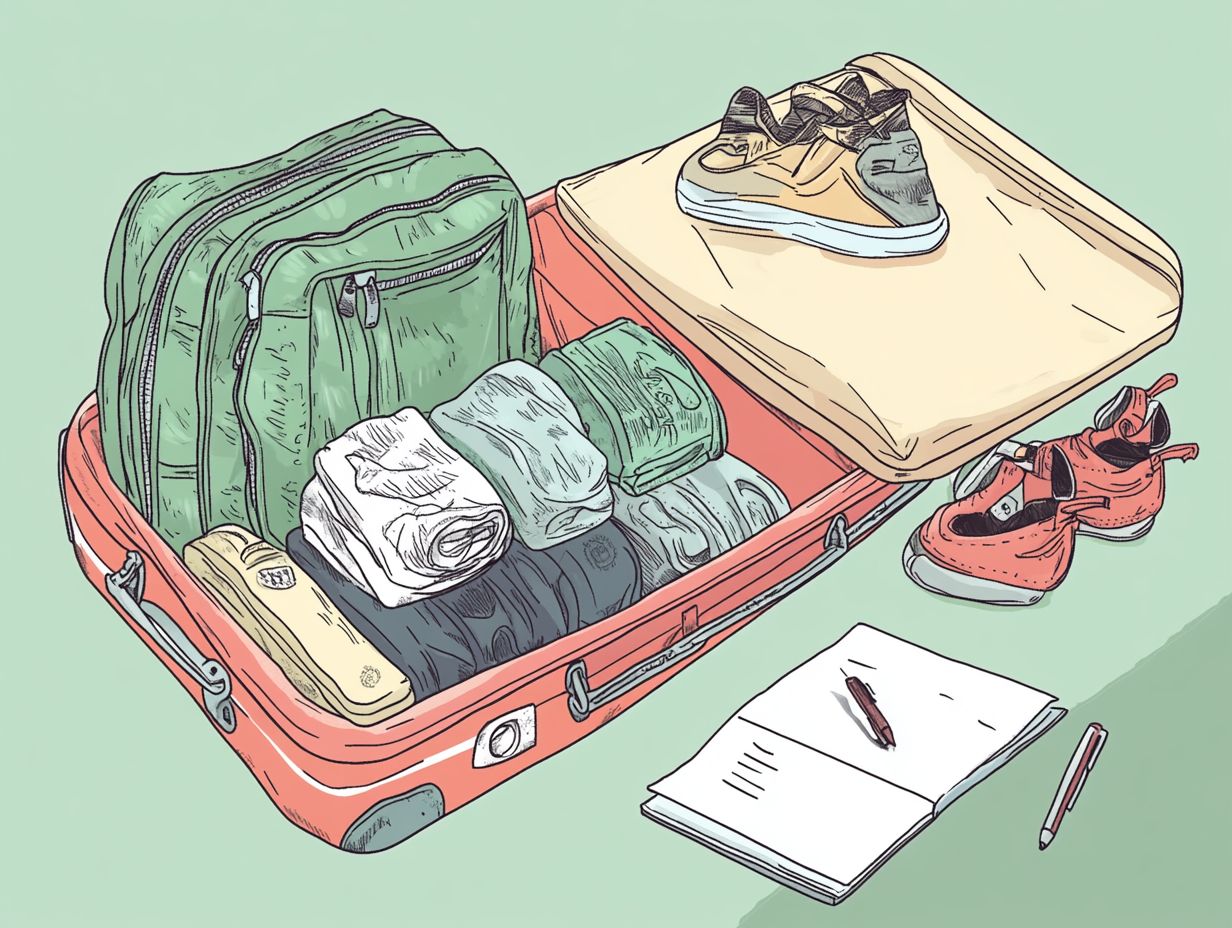
Maximizing space in your luggage is crucial for study abroad travelers, ensuring you can pack all your essentials without exceeding weight limits.
Consider using packing cubes to neatly segment your clothing and necessities. They work wonders in keeping things in order.
Think about the smart arrangement of your items to achieve better weight distribution. This makes it easier to access your important documents and travel essentials.
By meticulously planning your packing strategy, you can streamline your luggage and enhance the enjoyment of your journey.
Using Packing Cubes and Compression Bags
Packing cubes and compression bags are effective tools for organizing your belongings and maximizing space.
These innovative items help streamline your packing process. Packing cubes come in various sizes, allowing you to categorize your clothing items like tops, bottoms, and undergarments.
Compression bags remove excess air, significantly reducing bulk. This not only frees up space for extra essentials but also helps prevent wrinkles, keeping your clothes fresh for your journey.
When utilizing these items, consider rolling your clothes instead of folding them for optimal space-saving. Color-coding your packing cubes can also make locating specific items during your travels a breeze.
Smart Arrangement of Items
The smart arrangement of items in your luggage greatly enhances accessibility and organization during your study abroad journey.
This method streamlines your packing process and reduces stress as you navigate new environments.
Stashing vital items like passports, visas, and travel itineraries in an easily accessible pocket can save you precious time. Using a carry-on bag for immediate necessities such as chargers, toiletries, and a change of clothes provides peace of mind and helps you adapt to travel delays.
What Not to Pack
Knowing what to leave out of your study abroad journey is as essential as knowing what to include.
This awareness will lighten your load and make your trip smoother. Consider leaving behind bulky electronics or an overabundance of clothing; these items can often be purchased once you arrive.
Being mindful of items that might be restricted or prohibited in your host country is crucial for ensuring a smooth transition.
Items You Can Buy Abroad
Don t miss out on the chance to discover local treasures! Recognizing the items you can purchase abroad lightens your luggage and immerses you in local culture and customs.
By choosing to buy local souvenirs, you gain unique insights into the traditions and craftsmanship of your destination.
Vibrant textiles and handmade pottery beautifully reflect the artistic heritage of the region. Indulging in regional delicacies, whether it s gourmet spices or local sweets, allows you to savor a piece of the place you ve visited.
These items serve as memorable keepsakes and support local artisans and economies, strengthening the community. Embracing these cultural norms enriches your travel experience and deepens your connection with the locale.
Items That May Be Restricted

Being aware of restricted or prohibited items while studying abroad is essential to avoid potential issues with customs and ensure compliance with local laws.
This includes common items such as certain agricultural products, sharp objects, and specific electronics that may not align with local regulations. For instance, carrying fresh fruits, vegetables, or meats could lead to hefty fines or confiscation.
Exercise caution with medications as what is legal in one country could be illegal in another. Keep all travel documents like visas and health insurance details organized, as these documents are vital for a smooth entry and uninterrupted stay in your host country.
Frequently Asked Questions
How can I pack light for my study abroad experience?
Packing light for your study abroad is easy with a few simple tips. Choose a lightweight suitcase or backpack and pack only the essentials. Roll your clothes to save space and opt for travel-sized toiletries. Additionally, you can learn how to stay organized while studying abroad by thinking about bringing items that can serve multiple purposes, like a sarong that works as a towel or scarf.
How many outfits should I pack for my study abroad trip?
Pack enough outfits for your study abroad trip, but limit yourself to a maximum of 10-12 outfits. Consider the climate and culture of your destination, and choose versatile pieces that can be mixed and matched. Remember, you can always do laundry while abroad, so don t overpack.
What are some essential items to pack for a study abroad trip?
- A valid passport
- Necessary medication
- Travel documents
- A universal adapter (a device that allows you to plug your electronics into different types of outlets)
- Comfortable walking shoes
- A small first aid kit
- A journal to document your experiences
- A small gift from your home country for your host family or new friends
How can I save space when packing for my study abroad trip?
To save space, use packing cubes or compression bags to compress your clothing. Pack smaller items, such as socks and underwear, inside your shoes for extra room.
Should I pack any snacks for my study abroad trip?
Packing a few tasty snacks can make your journey even better, especially if you have dietary restrictions. This can be handy during long flights or when you’re in a new place and can’t find food that meets your needs. However, be mindful of customs regulations and avoid packing prohibited items.
How can I avoid overpacking for my study abroad trip?
To avoid overpacking, make a packing list and stick to it. Be realistic about how often you’ll wear certain items and pack versatile pieces that can be worn multiple times. Lay out all your items before packing to identify unnecessary duplicates or items that can be left behind.

